Distinguished Research Professors
The title of Distinguished Research Professor recognizes senior faculty members who are internationally recognized for their innovative body of work and its transformational impact on the field. The Professorship is awarded to individuals working at the very top of their discipline, who are recognized as preeminent leaders in their fields of study.
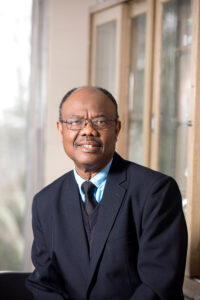
• Samuel E. Aggrey, Richard B. Russell Endowed Chair and professor in the College of Agricultural and Environmental Sciences’ poultry science department, is a global leader in developing and applying emerging technologies of quantitative genetics, molecular biology and bioinformatics to critical issues in the poultry industry. His research interests include genome selection, genomics of nutrient utilization, molecular and cellular bases of stressors, and genetic improvement of poultry. He has made advances in understanding linkages among nutrient components, parasite load and genetics that affect birds’ microbiome and gut health. As part of an international consortium, he helped identify and map 14,000 genes associated with growth and development in poultry, which aid breeders in producing more disease-resistant, feed-efficient and heat-tolerant birds. He has also improved understanding of pressures on poultry production, such as water intake and heat stress.
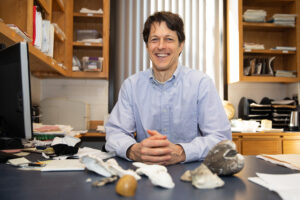
• James E. (Jeb) Byers, UGA Athletic Association Professor in the Odum School of Ecology, is an internationally prominent scientist in the disciplines of population, community and marine ecology. He is best known for his research quantifying and predicting the success of biological invasions. Byers has performed some of the world’s leading ecological studies on interactions among native organisms and nonnative species. He has built mechanistic mathematical models to analyze the impacts of climate change, including expansions of invasive parasites and subtropical species into the state’s marine and freshwater resources. His approach combines experimental work and fieldwork at local, regional and continent-wide scales with computational models, providing critical theoretical insights. His body of research has been cited more than 16,500 times, with 17 papers
exceeding 200 citations each.
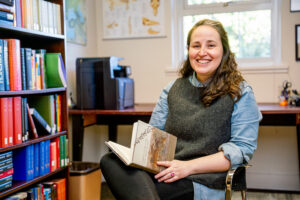
• Jamie Kreiner, professor in the Franklin College of Arts and Sciences’ history department, is a historian of Europe and the Mediterranean world in the early Middle Ages (400 to 800 CE). Her research asks how and why cultures changed in societies that remade themselves as the Roman Empire fractured. She questions how ideas and norms—about good government, wealth or nature, for example—were intertwined with different forms of power and influence and attempts to discover how early medieval communities themselves wrestled with those dynamics. These questions have guided her research. Most recently, her book, “The Wandering Mind: What Medieval Monks Tell Us About Distraction” (Liveright, 2023), tracks early Christian monks’ frustrations with distraction and their inventive and sometimes contentious efforts to make themselves concentrate—and it shows how their moralization of the problem foreshadowed a current age of distraction.
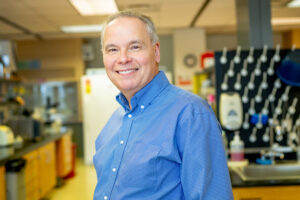
• Aaron Mitchell, professor and head of the Department of Microbiology in the Franklin College of Arts and Sciences, is a world leader in the genetics, molecular biology and virulence mechanisms of pathogenic fungi— particularly Candida albicans, the most prevalent fungal pathogen in humans. Contributing to a greater understanding of biology and infectious diseases, he has enabled modern molecular biological studies of C. albicans, using genetic and genomic tools to explore fungal pathogenesis and drug resistance. His discoveries include a greater understanding of the genetic basis for biofilm formation, which can render microbial pathogens resistant to antimicrobial agents and even physical removal. These advances on fungal biofilms are paradigm shifting. His group’s recent research, drawing on advances in omics, reveals natural variations in the genetic regulation of biofilms and the core network that might be targeted for antifungal therapy.
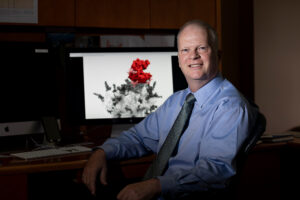
• Robert J. Woods, professor in the Department of Biochemistry and Molecular Biology in the Franklin College of Arts and Sciences and the Complex Carbohydrate Research Center, has received recognition for his innovative research in glycoscience—the chemical biology and biomedical impact of complex carbohydrates (glycans) covering surfaces of cells and viruses. His work applies expertise in molecular structures and computational modeling to understand glycan structure and function. By integrating experimental data with molecular dynamics calculations, Woods has illustrated that the space occupied by glycans in both the HIV envelope protein and SARS-CoV-2 spike protein modulates immune recognition and can help guide vaccine design. He developed a web environment for building complex glycans that allows users to computationally explore the molecular dynamics of glycans and their interactions with other biomolecules.
Creative Research Awards
These awards recognize established investigators whose overall scholarly body of work has had a major impact on the field of study and has established the investigator’s international reputation as a leader in the field.
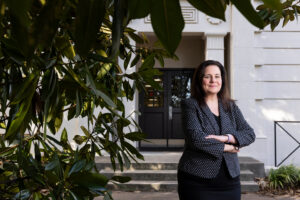
• Christina Boyd, Thomas P. and M. Jean Lauth Professor of Political Science in the School of Public and International Affairs, is one of the nation’s most important scholars researching diversity in the courts. She has published 34 refereed journal articles and two books, including “Supreme Bias: Gender and Race in U.S. Supreme Court Confirmations” (Stanford University Press, 2023). In “Supreme Bias,” Boyd and her co-authors examine the dynamics of gender and race at the Supreme Court confirmation hearings held before the Senate Judiciary Committee. The authors use extensive new data and qualitative evidence to highlight how female nominees and people of color nominees have faced significantly more challenges during the confirmation process than their white male colleagues, revealing that race and gender bias exists even at the highest echelon of U.S. legal power.
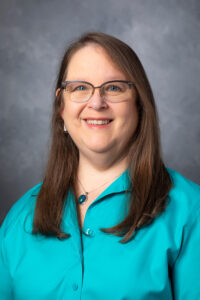
• Jessica Kissinger, Distinguished Research Professor in the Franklin College of Arts and Sciences’ genetics department and former director of the UGA Institute of Bioinformatics, has focused her interdisciplinary career on the question of how parasites evolve. She has been a driving force behind the groundbreaking effort to create and maintain novel bioinformatics databases covering omics data for hundreds of dangerous pathogens. The Eukaryotic Pathogen, Vector, and Host Informatics Resources knowledgebase (VEuPathDB.org) is an integrated, centralized resource for data mining on more than 500 organisms. Databases searches are free, permitting researchers to gain insights into and test hypotheses that may pave the way for new approaches to treating or preventing diseases such as malaria and Cryptosporidium (a waterborne parasite). Kissinger has used the databases and other bioinformatics tools to make remarkable discoveries.
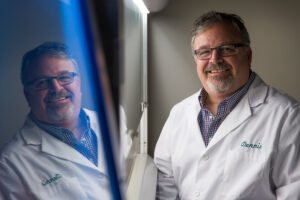
• Dennis E. Kyle, professor of cellular biology and infectious diseases in the Franklin College of Arts and Sciences and the College of Veterinary Medicine, is one of the top parasitologists in the world. Kyle serves as director of the Center for Tropical and Emerging Global Diseases, and some of his most recent work focuses on discovery of new drugs that eliminate dormant vivax malaria that can linger in the liver. His group has discovered new drug series that target the dormant liver stages and is moving these novel therapeutics through preclinical studies. He also works on Naegleria fowleri, a rare but deadly parasite known as “brain-eating amoebae.” More than 97% of people infected with these amoebae die within two weeks. Kyle has conducted research into that pathogen, leading to effective repurposed drugs and the first rapid, sensitive diagnostic method.
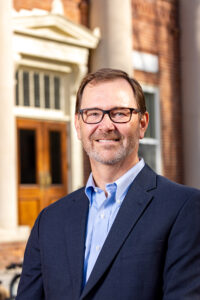
• J. Derrick Lemons, associate professor in the Franklin College of Arts and Sciences’ Department of Religion, has played a central role in establishing, advancing and naming a new interdisciplinary sub-field of research: theologically engaged anthropology. A recipient of two major John Templeton Foundation grants, he asserts that theological knowledge can enhance anthropological work on religion, and cultural anthropology can influence theology. His edited book, “Theologically Engaged Anthropology” (Oxford University Press, 2018), places the development of theologically engaged anthropology in an intellectual context and offers a roadmap for developing it.
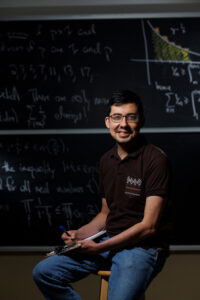
• Paul Pollack, professor in the Franklin College of Arts and Sciences’ mathematics department, is an expert in the field of number theory, a branch of mathematics concerned with properties of whole numbers. In his creative research project, he demonstrated how methods from the well-established field of analytic number theory can be brought in to derive powerful new results in the burgeoning area of arithmetic statistics. His work has contributed to some of the most significant contemporary research programs in arithmetic statistics: understanding growth rates of number-field-related arithmetic functions and classifying the torsion of elliptic curves.
Creative Research Medals
The university established the Creative Research Medals in 1980 to recognize a distinct and exceptional research or creative project, performed by a mid-career faculty member, with extraordinary impact and significance to the field of study.
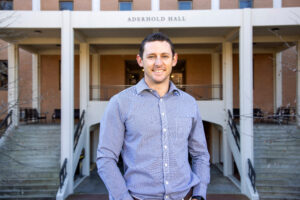
• Logan Fiorella, associate professor in the Mary Frances Early College of Education’s educational psychology department, has developed a novel framework of how students “make sense” of what they are learning, particularly within science, technology, engineering and mathematics (STEM). The framework is based on his extensive program of empirical research investigating the benefits and boundaries of generative learning activities, including learning by explaining and learning by drawing. Fiorella’s work fills several gaps in prior research by specifying the unique and complementary cognitive functions of distinct modes of generative sense-making—explaining, visualizing and enacting—and by providing practical recommendations for implementing appropriate instructional methods and learning activities. His work demonstrates how guiding students to mentally visualize and enact the learning material allows them to explain and generalize what they have learned in new situations.
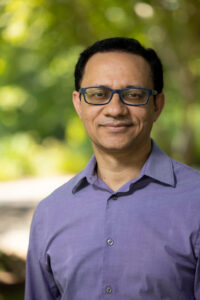
• Hitesh Handa, associate professor and Distinguished Faculty Fellow in the College of Engineering’s School of Chemical, Material, and Biomedical Engineering, is developing nitric oxide (NO) releasing biomaterials for medical devices to decrease the morbidity, mortality and hospitalization costs associated with thrombosis and infection. NO is a potent anti-inflammatory and inhibitor of platelet activation. Handa’s group is designing novel surfaces that release NO, mimicking the human physiology of NO production to make medical devices hemocompatible and antimicrobial. This state-of-the-art coating is now progressing toward commercialization. Handa’s startup, Nytricx Inc., has received more than $3.5 million in funding from a National Institutes of Health Phase II Small Business Innovation Research grant and a Defense Medical Research Development award to expedite the commercialization process.
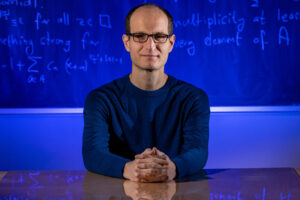
• Giorgis Petridis, associate professor in the Franklin College of Arts and Sciences’ mathematics department, and his colleague Brandon Hanson (now at the University of Maine), published a 2021 breakthrough paper in The Proceedings of the London Mathematical Society, the flagship journal of the LMS. The paper deals with a well-known problem in the structure of Paley graphs, a fundamental model allowing mathematicians to address deep questions with applications in coding theory and cryptography. In an argument that takes slightly more than a page, Petridis and Hanson apply the polynomial method to make progress on a problem many others have tried but failed to crack. The paper attracted the attention of mathematicians because of its surprisingly brief and elegant proof based on a creative and imaginative approach. Petridis has published several other high-impact research papers. His research has been continuously funded by the National Science Foundation since 2015.
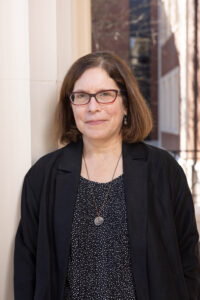
• Susan Rosenbaum, associate professor in the Franklin College of Arts and Sciences’ English department, collaborated with colleagues at Davidson College and Duquesne University in a field-changing digital humanities project, Mina Loy: Navigating the Avant-Garde. The project, which has brought Mina Loy from the margins of modernist studies into the spotlight, is a scholarly contribution of various approaches, depending on which part of the website is visited. The website offers a scholarly guide to Loy’s career including close readings of her writing, designs and visual art; edited biographies of Loy and her cohort; a venue for student scholarship featuring digital humanities tools; and an intensive immersion in Loy’s style, writing, life and travels. Combining archival research and creative activity and linking elements of avant-garde design to original scholarship, this initiative has sparked greater interest in modernist women writers and paved a new path for research.
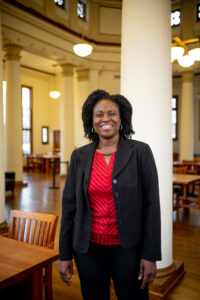
• Juliet Sekandi, associate professor in the College of Public Health’s Department of Epidemiology and Biostatistics and the Global Health Institute, has conducted one of the first pilot evaluations of the feasibility, acceptability and cost of using video directly observed therapy (VDOT) among tuberculosis patients in her home country of Uganda. She recently published results of a federally funded randomized clinical trial showing VDOT improved treatment completion to nearly 90%. In VDOT, a smartphone app records the patient taking the prescribed medication; the patient then sends the video via an encrypted message to a health provider who views it and assesses adherence. For patients with drug-resistant tuberculosis, VDOT would help ensure adherence to a new oral antibiotic available to treat this disease strain. Sekandi is working with colleagues in the School of Computing to develop novel facial recognition software to read and interpret videos of patients’ adherence with minimal human input.
Inventor of the Year Award
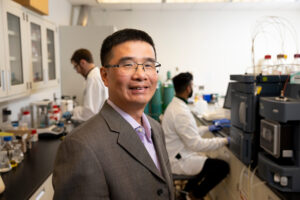
Qingguo (Jack) Huang, professor in the College of Agricultural and Environmental Sciences’ crop and soil sciences department, studies environmental catalysis and its applications in soil remediation, wastewater treatment and resource reuse. He developed an electrochemical process to degrade PFAS (per- and poly-fluoroalkyl substances, also known as “forever chemicals”) that are widely present in water resources from longstanding use in both manufacturing and as ingredients in numerous products. The global engineering consulting firm AECOM has licensed the technology and markets it as the DE-FLUORO system in Australia, Europe and the U.S. as a means of destroying PFAS in water streams.
Entrepreneur of the Year Award

John Gibbs, associate professor in the Franklin College of Arts and Sciences’ theatre and film studies department, specializes in 3D computer modeling and animation and artificial intelligence in the creative arts. Gibbs is co-founder of Artimatic, Inc., a company that applies machine learning and AI to help digital artists realize their creative vision. Gibbs is a named inventor on the patent-protected, underlying technology licensed to Artimatic through a Georgia Startup License, which streamlines the licensing process for eligible companies. Artimatic’s first product, skiNNer, has the potential to revolutionize computer animation, speeding up tedious and time-consuming weighting processes.
Early Career Scholar Awards
Established by the UGA Research Foundation, these awards recognize junior faculty whose research, creative and scholarly achievements indicate a trajectory toward an exceptional, sustained research career and an imminent rise to international stature in their field of study.

• Drew Abney, assistant professor in the Franklin College of Arts and Sciences’ psychology department, is a leader in developmental and cognitive science. He studies how behaviors and social interactions affect developmental trajectories through infancy and into toddlerhood. Abney has conducted studies focusing on infants’ developing vocalizations and how they change during interactions with caretakers. He has shown that caregivers and infants engage in more coordinated responses when vocalizations are relatively speech-like. He has identified a non-random structure to the clustering of vocalizations by infants as early as 11 days of age. Over the first two years, infants and caregivers become increasingly coordinated, providing the infrastructure for conversational turn-taking. By questioning assumptions about fundamental aspects of communication and trust, he offers ways to measure and explore the complex interactions of infants, toddlers and caregivers.
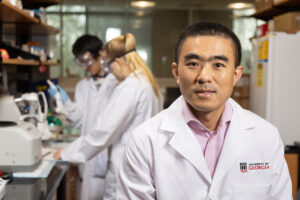
• Pengpeng Bi, assistant professor in the Franklin College of Arts and Sciences’ genetics department and Center for Molecular Medicine, has contributed to understanding the molecular mechanisms of muscle development and regeneration. His role in discovering, characterizing and naming the protein Myomixer was a substantial advance. Muscle growth and repair depend on the fusion of smaller muscle cells. Bi identified the protein Myomixer as a switch for human muscle cell fusion. His group used a suite of model and non-model organisms to investigate the origin of muscle cell fusion, shedding light on a deep mystery of vertebrate evolution. His group is spearheading the development of a CRISPR toolkit to create genetically engineered mouse models and identify new genes essential for muscle development. These works have been published and constitute a resource for all investigators who employ mouse models, including those outside the muscle biology field.
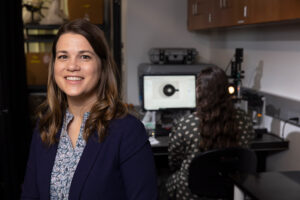
• Amanda Frossard, assistant professor in the Franklin College of Arts and Sciences’ chemistry department, has developed new techniques to study the ocean surface and marine aerosol production through a combination of field and laboratory studies. She has built a reputation as an expert in ocean surfactants—chemicals that reduce surface tension—and their transfer to sea spray aerosol. Her group developed analytical methods for surfactant characterization in aerosol particles and seawater. Frossard designed and fabricated an aerosol optical trap instrument to study single-particle absorption of water, and she has undertaken six field studies for sample collection, including multiple research cruises. She received a five-year National Science Foundation CAREER grant award, reflecting that her work is reshaping long-held conventional views of the cycling of particulate organic matter in marine air.
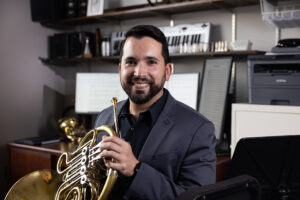
• James Naigus, assistant professor of horn at the Hugh Hodgson School of Music, seeks to inspire the next generation of musicians and creative thinkers through artistic empowerment and enthusiastic innovation. He continues to impress the international music community as a performer and a prolific composer, with a catalog of more than 80 published works. Naigus’ compositions are performed around the world, providing challenging repertoire for players and engaging experiences for the audience, with more than 350 performances of his works over the past five years by distinguished musicians at venues of note, including the New York Philharmonic Orchestra, widely considered the most prestigious in the United States. His music is audibly appealing and virtuosic while approachable to musicians of varied abilities. Naigus is sought after as a clinician and guest artist/educator at universities and music conferences.
Team Impact Award
Established by the UGA Research Foundation, these awards recognize junior faculty whose research, creative and scholarly achievements indicate a trajectory toward an exceptional, sustained research career and an imminent rise to international stature in their field of study.
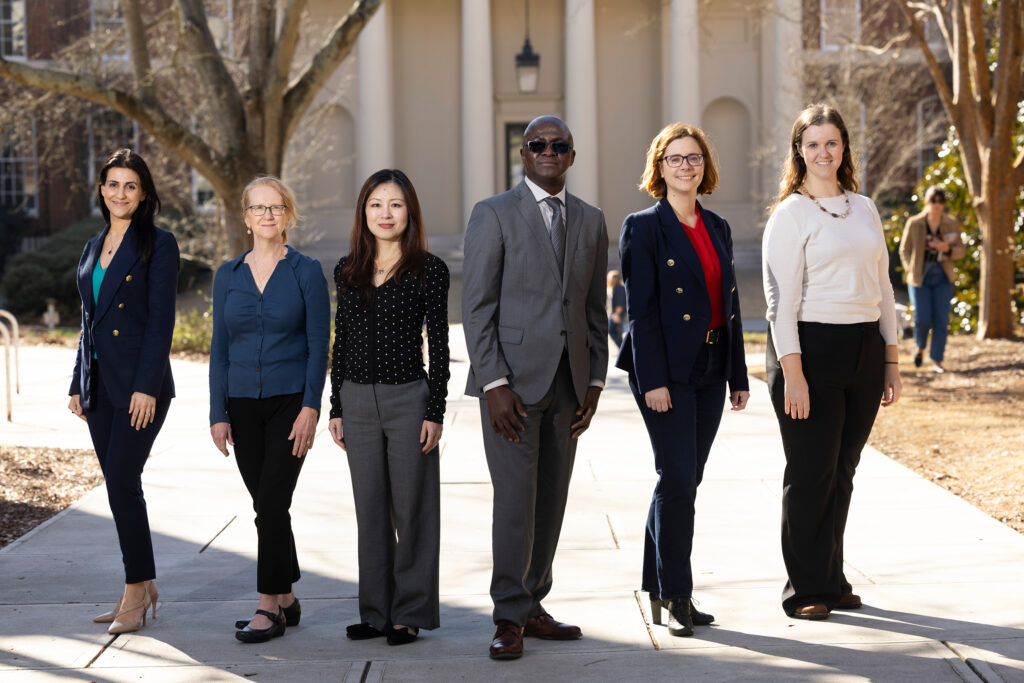
The Center on Human Trafficking Research & Outreach (CenHTRO) is an interdisciplinary effort based at the UGA School of Social Work, comprising faculty, staff and students on three continents and operating in 10 countries. The center, formally established in 2021, has built a global community of human-trafficking scholars, an unprecedented achievement in this field. Garnering $30 million in funding, CenHTRO supports rigorous and innovative trafficking studies incorporating the expertise of faculty in economics, international affairs, law, political science, public health, social work, sociology and statistics. Center researchers collaborate with multiple arms of the United Nations to encourage evidence-based interventions to prevent trafficking, support survivors and strengthen prosecution of traffickers. With the center’s guidance, governments have passed and enforced anti-trafficking laws and helped NGOs and nonprofits remove victims from slavery-like conditions. CenHTRO has trained almost 4,000 individuals—including judiciary members, law enforcement, social workers, educators, students and community groups—to improve local action against human trafficking.
Non-Tenure Track Faculty Research Excellence Awards

• Lydia Aletraris, associate research scientist in the School of Social Work, has made remarkable contributions to research innovation in social science and human trafficking. She is coordinator of the Prevalence Reduction Innovation Forum within the Center on Human Trafficking Research & Outreach. This U.S. Department of State-funded initiative aims to improve the science of human trafficking estimation. Aletraris’ leadership skills are instrumental in providing direction to the international PRIF teams that implement trafficking prevalence studies in six countries. She plays a vital role in developing standardized statistical trafficking indicators and definitions for researchers to use in prevalence estimation of populations that are hidden and hard to measure.
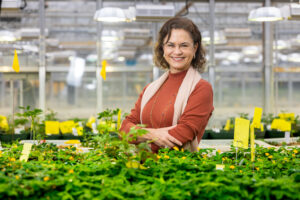
• Soraya Leal-Bertioli, senior research scientist in the College of Agricultural and Environmental Sciences’ plant pathology department, is a preeminent scientist in identifying disease- and pest-resistance genes in wild peanuts and breeding them into the cultivated peanut, Arachis hypogea. While wild species have strong resistances, they also have many undesirable traits, making them unsuitable for modern production. To solve this problem, Leal-Bertioli uses molecular markers to tag the genomic regions conferring resistances. Her research is enabling the development of higher-yielding and more profitable peanuts that require fewer agrochemicals for Georgia and the southeastern U.S. while contributing to food security for Africa and Central America.
Research Communications Award

Michael J. Chamberlain, Terrell Distinguished Professor of Wildlife Ecology and Management in the Warnell School of Forestry and Natural Resources, is perhaps best known as the “Wild Turkey Doc.” He has developed a research program focusing on this popular game bird while disseminating his findings to audiences. Managing wild turkey populations under intensifying pressure from land-use changes and natural predators requires clear communications with conservationists and more than 2.5 million hunters nationwide. Chamberlain’s website, wildturkeylab.com, launched in 2022, provides content to those interested in wild turkeys.


